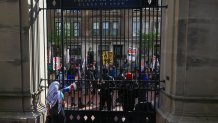What to Know
- Pro-Palestinian groups are protesting at colleges and universities across America, an outgrowth of a demonstration that yielded dozens of arrests at Columbia University last week
- Tensions have only escalated in the weeks since, with the NYPD called to assist in clearing protesters at Columbia and NYU; no serious injuries have been reported
- The groups are against Israeli military action in Gaza; they want the schools to divest from companies that help arm the country
Student protesters at Columbia University have committed to dismantling and removing a significant number of tents from the West Lawn, university officials said Wednesday, citing "important progress" in negotiations overnight.
The development comes hours after Columbia University President Minouche Shafik, facing mounting calls to resign over the burgeoning crisis, issued students a midnight deadline to come up with a plan to disperse the encampment.
In a middle-of-the-night update, a Columbia University spokesperson said student representatives of the protesters had agreed to a number of other conditions, including ensuring only affiliated students participate in the protest -- a move designed to oust purported "outsiders" that some, including Shafik and Mayor Eric Adams, blame for the escalation.
Get Tri-state area news delivered to your inbox. Sign up for NBC New York's News Headlines newsletter.
Among other concessions: Students in the encampment will comply with all FDNY requirements regarding activities and safety; and protesters have taken steps to make the encampment welcome to all and have prohibited discriminatory or harassing language.
Specifics on how these objectives would be met weren't immediately described, nor was it known if Columbia yielded to protesters' demands to any degree. Students have demanded Columbia divest from companies with links to Israel … and guarantee amnesty for students that have been suspended.
University officials called the latest discussions "constructive" and said the dialogue would continue. They expect to provide further updates in the next two days.
Local
“I very much hope these discussions are successful. If they are not, we will have to consider alternative options for clearing the West Lawn and restoring calm to campus so that students can complete the term and graduate," Shafik stated in a letter with the school community.
The negotiation push arrived the night before U.S. House Speaker Mike Johnson's trip to Columbia to visit with Jewish students and address antisemitism on college campuses. During his visit to the campus Wednesday, Johnson, a Republican, called on Shafik to resign "if she cannot immediately bring order to this chaos."
“If this is not contained quickly and if these threats and intimidation are not stopped, there is an appropriate time for the National Guard,” he said.
"As Speaker of the House, I am committing today that the Congress will not be silent as Jewish students are expected to run for their lives and stay home from their classes hiding and fear," Johnson told the crowd.
"Amid anti-Israel protests, Jewish students at Columbia University don't feel safe," Johnson posted Tuesday on X. "It’s become so dangerous that students were forced out of the classroom. Let’s be clear: these are not peaceful protests, these are antisemitic mobs."
On Wednesday evening, a Columbia spokesperson said rumors that the university had threatened to bring in the National Guard were unfounded. “Our focus is to restore order, and if we can get there through dialogue, we will,” said Ben Chang, Columbia’s vice president for communications.
Hours before the Speaker arrived at the school, New York Gov. Kathy Hochul delivered a preemptive strike against Johnson, accusing him of politicizing the conflict.
"A Speaker worth the title should really be trying to heal people, not to divide them," she said.

The encampment — which was noticeably smaller by Wednesday evening, with about 60 tents remaining — has occupied the school's West Lawn for the better part of the last four days, according to the university. There were additional protests outside the gates of the Ivy League school as well.
A pro-Palestinian student organization is asking Columbia to guarantee the safety of demonstrators inside campus by not bringing in the NYPD. Some faculty members also questioned the school’s hardline stance to remove protestors last week with the help of police.
"Within 24 hours just to call the NYPD, which is something that has a lot history and baggage, I thought it was totally disproportionate," said Barnard College Adjunct Professor Elga Castro.
Other members of the Columbia community have called for a censure vote against Shafik.
Police first tried to clear the encampment at Columbia last week, when they arrested more than 100 protesters. The move backfired, acting as an inspiration for other students across the country to set up similar encampments and motivating protesters at Columbia to regroup.
Following protests over the Israel-Hamas war on campus, the school made the decision to run classes on a hybrid basis through the remainder of the term. The action came a day after the school went remote for a day. Monday is the final day of classes, and exams should wrap up by the end of next week.
More than 100 protesters were arrested at New York University earlier this week as more colleges nationwide, including Yale, are seeing protests.



